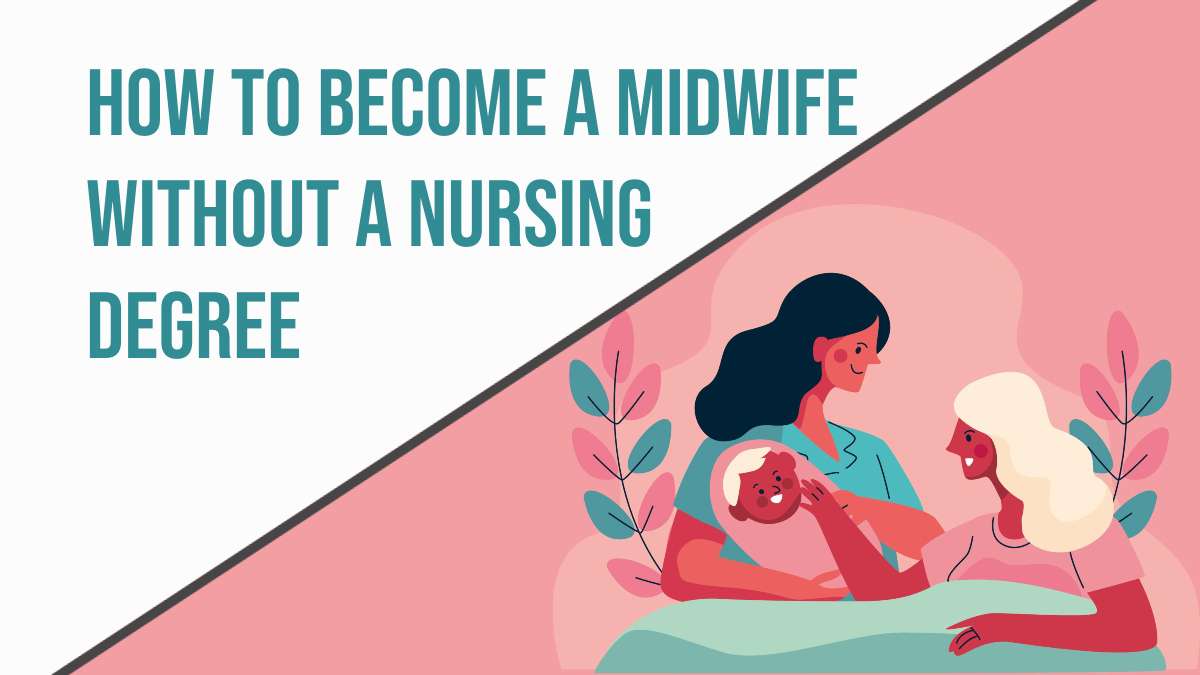
Have you ever considered pursuing a career as a midwife? If so, you may be asking how to become a midwife without a nursing degree? Let me state unequivocally that it is feasible! Here are some suggestions for becoming a midwife without a nursing degree.
Becoming a midwife without a nursing degree walks the reader through all of the questions they should ask themselves to determine if midwifery is the correct career.
Midwifery is an amazing industry to be a part of since it affects mothers, infants, and families so much.
Many hospitals are now hiring midwives, which opens up additional chances for people interested in pursuing this lucrative career path. It takes a lot of devotion to become a midwife, and it doesn’t happen immediately for most individuals.
But what about individuals who have always wanted to be midwives but have never finished their education? Are you one of those individuals? Perhaps you dropped out or opted to pursue another degree at university.
Maybe you want to go back to college but can’t afford it, maybe you dropped out because you didn’t enjoy what you were learning, or maybe you decided university wasn’t the right place for you.
Also, you can able to know,
What is a Midwife and What Do They Do
A midwife is a health care provider who aids women before, during, and after childbirth. Midwives deliver infants in various settings, including hospitals, private homes, and birthing centers.
The major aims are to monitor women’s health, comfort, and safety throughout the birthing process while avoiding needless medical interventions.
Midwives may also give education, information, and counseling to expecting and new moms about the delivery process and after that.
A midwife’s typical responsibilities include:
# Performing gynecological checkups regularly.
# Providing prenatal and preconception care.
# Offering breastfeeding, pregnant health, nutrition, exercise, fertility, and baby care instruction and information.
# Assisting with labor and delivery.
# They educate women on their birthing alternatives and which is best for their specific circumstances.
# The health of the expecting woman and her unborn child is being monitored.
# Providing post-delivery follow-up care.
# A midwife’s job is determined by several circumstances, including the midwife’s certification and the state in which they operate. Midwives work with women of all ages and stages, although they are most usually associated with pregnant women throughout pregnancy and childbirth.
How to Become a Midwife (Step by Step)
Is it possible to become a midwife without a nursing degree? Yes, you certainly can! Using your current skills, knowledge, and natural intuition, you can do it.
The part provides a comprehensive step-by-step guide to a satisfying profession as a midwife – ideal for ‘following your ambitions’ while simultaneously helping others.
Suppose you want to be a midwife but lack the necessary credentials. In that case, you may complete an Access to Higher Education Diploma online and apply for a midwifery degree without A-levels.
Why should you skip up on your desired job as a midwife? Especially, there are no age limits, so it’s never too late to get started.
Because there is a nationwide shortage of midwives, now is a great moment to start your online Access to Higher Education Diploma (Midwifery).
Get the Education you Need
Determine the sort of midwifery certification you wish to pursue and complete the appropriate bachelor’s degree or science curriculum. To finish a range of relevant courses, consider acquiring a Bachelor of Science in Nursing degree or one in a similar health science subject.
To become a midwife, you must first complete a midwifery education program
Apply to one of the several U.S. midwifery schools that best fit your prior education.
Working as a registered nurse or doula will help you stand out in your application, and better prepare you for coursework and training in a graduate-level midwifery program.
Gain hands-on experience witnessing and helping in deliveries under the supervision of a trained midwife throughout your program.
Exams for Certification must be passed
After completing your degree, you will need to pass the necessary tests to receive your full qualifications and apply for licensure in your state.
Obtain useful Experience
Working as a nurse or in another healthcare environment before or throughout your graduate education may help you prepare for a midwifery career.
While watching medical experts and caring for patients, you may improve your communication, interpersonal, and problem-solving abilities.
Apply for Employment as a Midwife
Make a detailed resume containing your relevant schooling and undergraduate and graduate school courses. Make sure to include information on your supervised clinical and other healthcare experience. You may apply for jobs at hospitals, clinics, and birthing centers.
Required Skills to Become a Midwife
Midwives use several hard and soft skills to treat and help patients, including the following appropriately:
Read more: How to Become a Nurse Practitioner Without a Nursing Degree
Communication
During each stage of a patient’s pregnancy, this health care personnel must communicate vocally. Midwives may use active listening and read body language to understand better how their patients feel to guarantee their treatment and labor safety.
Another communication method often used to bring comfort and encouragement to the patient during delivery is to adopt a calm tone of voice.
Empathy Midwives must understand their patients’ wishes, interests, and worries to appropriately respond to their queries and ensure safe, pleasant labor.
When advising new parents on caring for their newborn, such as during strenuous activities like feeding, these specialists often use empathy.
Leadership
Midwives guide patients and support attendants through labor as medical professionals to safeguard the patient’s and newborn’s safety.
When assisting parents in making a birth plan, deciding between a hospital or home birth, and making other vital choices, they put their leadership abilities to the test.
Analyzing Data
Midwives often assess patients’ physical and emotional health and recommend pharmacological or natural therapies that best suit their requirements. They may use medical data to examine patients during childbirth by recording and interpreting it.
They may also need to determine whether or not to call in more medical help to keep patients and their newborns safe and healthy.
Read more: How to Become a Director of Nursing
Where Can You Take Your Career As a Midwife
Midwives work in various settings, including NHS hospitals, private maternity facilities, GP practices, birth centers, and the community. You may specialize in newborn critical care after gaining experience as a general midwife.
The starting salary for a midwife is £21,000, with senior professionals earning up to £40,000. There are many possibilities to take on greater responsibility since there are clear paths for advancement.
Also, a day in the life of a midwife will never be the same. Attending a home birth, educating student midwives, or working in a clinic are possibilities. It’s a gratifying job that appeals to individuals of various educational and professional backgrounds.
How Long Does It Take to Become a Midwife
The education needed of midwives varies depending on the certification sought. A master’s degree in nurse-midwifery is required for certification, and most nurse-midwifery programs need a bachelor’s degree in nursing and some nursing experience.
But some schools accept RNs with an associate degree.
Nurse-midwives should choose a recognized program by the Accreditation Commission for Midwifery Education.
These programs teach health assessment, high-risk pregnancy, well-woman care, complication management, nursing research, and pharmacology. Students also do clinical rotations in several areas of midwifery.
This includes four years of undergraduate study, one year of nursing experience, and three years in a nurse-midwifery program. Also, some CNMs may take less or more time to get certified.
No nursing experience is necessary; becoming a CM may take less time.
The Average Salary of a Midwife
A midwife’s average yearly salary in the United States is $103,779. However, a midwife’s income is affected by many circumstances. These characteristics include a midwife’s title and certificates, the company for whom they work, and the state in which they live. Midwives may also get extra income in the form of overtime. Midwives earn an average of $10,625 per year in overtime pay.
Read more: How to Become a Surgical Nurse
Conclusion
A job as a midwife may be a possibility if you want to make a positive difference in women’s lives. A midwife is a highly skilled practitioner who has finished extensive healthcare training and expertise in holistic women’s health care.












